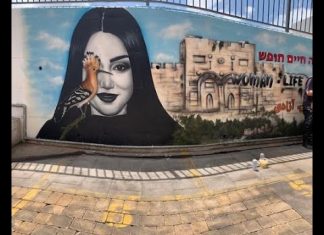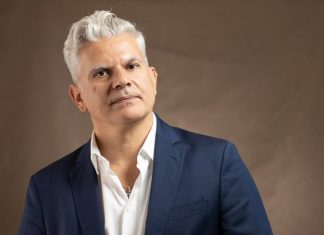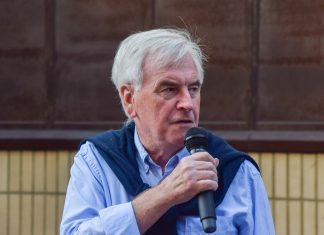The U.S. is still prepared to engage in talks with the Islamic Republic of Iran without preconditions, State Department Spokeswoman Morgan Ortagus told Kayhan Life in an interview.
“On numerous occasions, this administration, both privately and publicly — the U.S. — has offered help, aid and assistance to the Iranian people,” Ortagus said in the April 21 conversation. “That offer still stands. We find it very sad and discouraging that the regime refuses our help. There is no string attached to this aid.“
[aesop_image img=”https://kayhanlife.com/wp-content/uploads/2020/04/2019-12-11T144302Z_226174328_RC22TD9U1T04_RTRMADP_3_USA-TRUMP-POMPEO-scaled.jpg” panorama=”off” credit=” REUTERS/Yuri Gripas” align=”center” lightbox=”off” captionsrc=”custom” caption=”FILE PHOTO: U.S. State Department spokesperson Morgan Ortagus attends a press briefing by U.S. Secretary of State Mike Pompeo at the State Department in Washington, U.S.” captionposition=”left” revealfx=”off” overlay_revealfx=”off”]
Iranian officials have been critical of U.S. President Donald Trump’s offer to provide aid to Iran to fight the coronavirus pandemic “if they asked for it.” President Rouhani has described as “inhumane” the U.S. sanctions imposed on Iran during the pandemic. Visiting Damascus this week, Iranian Foreign Minister Mohammad Javad Zarif said that by refusing to lift the sanctions on Iran and Syria during the coronavirus pandemic, the U.S. was revealing its true intentions to the world.
“This is something the regime in Iran does quite often: Instead of taking responsibility for their own mismanagement of their own public health sector in Iran, they deflect blame,” Ortagus said. “The U.S. sanctions have never and will never cover medical equipment and humanitarian aid. There have always been exemptions for these items and there will always be.”
Meanwhile, the Islamic Republic has asked for a $5 billion emergency loan from the International Monetary Fund (IMF) to finance its efforts to combat the coronavirus. The European Union is vigorously supporting the application, in addition to pledging to provide 20 million euros in humanitarian aid to Iran.
Abdolnaser Hemmati, the Governor of the Central Bank of Iran has proposed that the IMF pay Iran directly via the EU-Iran Instrument in Support of Trade Exchanges (INSTEX) or via the Swiss Humanitarian Trade Arrangement (SHTA). The U.S. has worked with Switzerland to set up this financial channel for humanitarian goods, which is strictly monitored to avoid misuse by the Iranian regime.
While there is powerful support within the IMF from the European Union member states for this emergency loan, the U.S. does not appear as forthcoming.
“The most powerful voices in this debate are the many Iranian dissidents and former political prisoners who have written to the IMF to tell their story and to argue against this loan,” Ortagus told Kayhan Life. “These are the type of people who know what the regime would use this money for.”
In the letter, the signatories expressed concern “about the lack of adherence by the government of Iran to international standards in financial reporting, anti-money laundering and financing of terrorism, which has culminated in Iran’s designation as a high-risk jurisdiction by The Financial Action Task Force (FATF) in February 2020.”
IMF Leaves Out Iran As It Gives Coronavirus Aid to Multiple Countries
Last week, the Supreme Audit Court of the Islamic Republic reported that $4.8 billion of Iranian government funds had gone missing. In response, President Hassan Rouhani’s chief of staff lambasted the court for keeping quiet about the financial activities of other branches of power and state-controlled institutions.
Back in January, Brian Hook, the U.S. Special Envoy for Iran, referred to a letter sent by President Rouhani’s chief of staff to ministers seeking an explanation for the “disappearance” of more than 1 billion euros intended for medical supplies. He also pointed to reports that 2 million euros intended for heart stents were instead spent on electrical cables, and $180 million earmarked for medical supplies were instead spent on tobacco and cigarette paper.
In the interview, Ortagus indicated that Hook, the Special Envoy for Iran, had secured the recent release of two U.S. citizens by acting through intermediaries.
The two Americans were: Michael White who was detained in Iran in 2018 and freed on medical furlough in Iran last month; and Amer Fakhoury, a Lebanese-American who was detained in Lebanon in September 2019, and recently released and flown back to the U.S.
“While we have been grateful for that opportunity,” Ortagus said, “we continue to work behind the scenes to call for the regime to release all wrongfully detained Americans and dual citizens. This is one of our highest priorities.”





